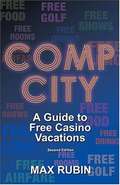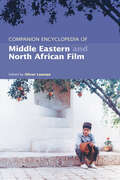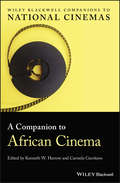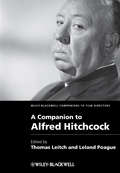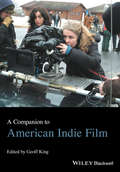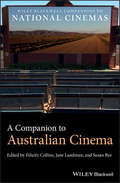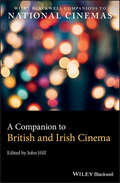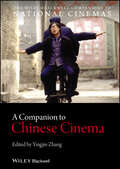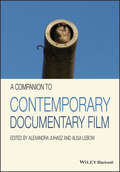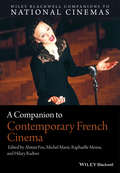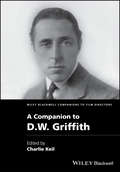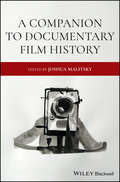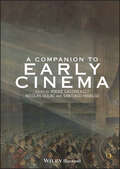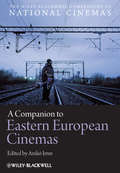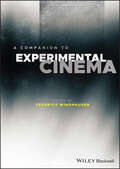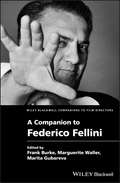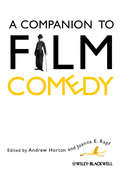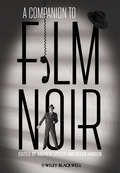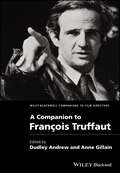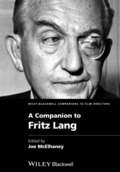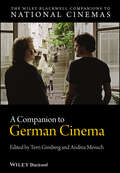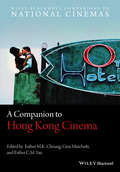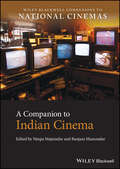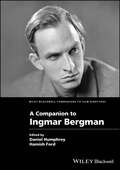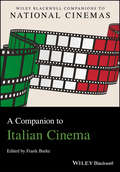- Table View
- List View
Comp City, A guide to Free Las Vegas Vacations
by Max RubinWin every time you gamble? Is that possible? It is if you play for comps. Every year, U.S. casinos give away more than a billion dollars worth of amenities to customers in return for their gambling action. These giveaways, known as "comps" (short for complimentaries), range from parking and drinks to gourmet meals and airfare. Are you getting your share? From nickel slot players to $500 a hand blackjack high rollers, Comp City has shown tens of thousands of gamblers how to get free casino vacations.
Companion Encyclopedia of Middle Eastern and North African Film
by Oliver LeamanThe Companion Encyclopedia of Middle Eastern and North African Film is a unique, one volume work which illuminates a fascinating variety of cinema which is little known outside its own area. The Encyclopedia is divided into nine chapters, each written by a leading scholar in the field. Each chapter covers the history and major issues of film within that area, as well as providing bibliographies of the leading films, directors and actors. The areas covered are: Central Asia, Egypt, Iran, Lebanon, Syria, Iraq, Kuwait, Libya, The Magreb, Palestine, Turkey. This Encyclopedia will be an invaluable reference tool for students and scholars of Film and Media Studies. It contains more than 60 black and white photographs of featured films, includes references and suggestions for further reading at the end of each chapter, and the volume concludes with comprehensive name, film and general indexes.
A Companion to African Cinema (Wiley Blackwell Companions to National Cinemas)
by Kenneth W. HarrowAn authoritative guide to African cinema with contributions from a team of experts on the topic A Companion to African Cinema offers an overview of critical approaches to African cinema. With contributions from an international panel of experts, the Companion approaches the topic through the lens of cultural studies, contemporary transformations in the world order, the rise of globalization, film production, distribution, and exhibition. This volume represents a new approach to African cinema criticism that once stressed the sociological and sociopolitical aspects of a film. The text explores a wide range of broad topics including: cinematic economics, video movies, life in cinematic urban Africa, reframing human rights, as well as more targeted topics such as the linguistic domestication of Indian films in the Hausa language and the importance of female African filmmakers and their successes in overcoming limitations caused by gender inequality. The book also highlights a comparative perspective of African videoscapes of Southern Nigeria, Ethiopia, and Côte d’Ivoire and explores the rise of Nairobi-based Female Filmmakers. This important resource: Puts the focus on critical analyses that take into account manifestations of the political changes brought by neocolonialism and the waning of the cold war Explores Examines the urgent questions raised by commercial video about globalization Addresses issues such as funding, the acquisition of adequate production technologies and apparatuses, and the development of adequately trained actors Written for film students and scholars, A Companion to African Cinema offers a look at new critical approaches to African cinema.
A Companion to Alfred Hitchcock (Wiley Blackwell Companions To Film Directors Ser. #12)
by Thomas Leitch Leland PoagueThe most comprehensive volume ever published on Alfred Hitchcock, covering his career and legacy as well as the broader cultural and intellectual contexts of his work. Contains thirty chapters by the leading Hitchcock scholars Covers his long career, from his earliest contributions to other directors’ silent films to his last uncompleted last film Details the enduring legacy he left to filmmakers and audiences alike
A Companion to American Indie Film (Wiley Blackwell Companions to Film Directors)
by Geoff KingA Companion to American Indie Film features a comprehensive collection of newly commissioned essays that represent a state-of-the-art resource for understanding key aspects of the field of indie films produced in the United States. Takes a comprehensive and fresh new look at the topic of American indie film Features newly commissioned essays from top film experts and emerging scholars that represent the state-of-the-art reference to the indie film field Topics covered include: indie film culture; key historical moments and movements in indie film history; relationships between indie film and other indie media; and issues including class, gender, regional identity and stardom in in the indie field Includes studies of many types of indie films and film genres, along with various filmmakers and performers that have come to define the field
A Companion to Australian Cinema (Wiley Blackwell Companions to National Cinemas)
by Felicity Collins Jane Landman Susan ByeThe first comprehensive volume of original essays on Australian screen culture in the twenty-first century. A Companion to Australian Cinema is an anthology of original essays by new and established authors on the contemporary state and future directions of a well-established national cinema. A timely intervention that challenges and expands the idea of cinema, this book brings into sharp focus those facets of Australian cinema that have endured, evolved and emerged in the twenty-first century. The essays address six thematically-organized propositions – that Australian cinema is an Indigenous screen culture, an international cinema, a minor transnational imaginary, an enduring auteur-genre-landscape tradition, a televisual industry and a multiplatform ecology. Offering fresh critical perspectives and extending previous scholarship, case studies range from The Lego Movie, Mad Max, and Australian stars in Hollywood, to transnational co-productions, YouTube channels, transmedia and nature-cam documentaries. New research on trends – such as the convergence of television and film, digital transformations of screen production and the shifting roles of women on and off-screen – highlight how established precedents have been influenced by new realities beyond both cinema and the national. Written in an accessible style that does not require knowledge of cinema studies or Australian studies Presents original research on Australian actors, such as Cate Blanchett and Chris Hemsworth, their training, branding, and path from Australia to Hollywood Explores the films and filmmakers of the Blak Wave and their challenge to Australian settler-colonial history and white identity Expands the critical definition of cinema to include YouTube channels, transmedia documentaries, multiplatform changescapes and cinematic remix Introduces readers to founding texts in Australian screen studies A Companion to Australian Cinema is an ideal introductory text for teachers and students in areas including film and media studies, cultural and gender studies, and Australian history and politics, as well as a valuable resource for educators and other professionals in the humanities and creative arts.
A Companion to British and Irish Cinema (Wiley Blackwell Companions to National Cinemas)
by John HillA stimulating overview of the intellectual arguments and critical debates involved in the study of British and Irish cinemas British and Irish film studies have expanded in scope and depth in recent years, prompting a growing number of critical debates on how these cinemas are analysed, contextualized, and understood. A Companion to British and Irish Cinema addresses arguments surrounding film historiography, methods of textual analysis, critical judgments, and the social and economic contexts that are central to the study of these cinemas. Twenty-nine essays from many of the most prominent writers in the field examine how British and Irish cinema have been discussed, the concepts and methods used to interpret and understand British and Irish films, and the defining issues and debates at the heart of British and Irish cinema studies. Offering a broad scope of commentary, the Companion explores historical, cultural and aesthetic questions that encompass over a century of British and Irish film studies—from the early years of the silent era to the present-day. Divided into five sections, the Companion discusses the social and cultural forces shaping British and Irish cinema during different periods, the contexts in which films are produced, distributed and exhibited, the genres and styles that have been adopted by British and Irish films, issues of representation and identity, and debates on concepts of national cinema at a time when ideas of what constitutes both ‘British’ and ‘Irish’ cinema are under question. A Companion to British and Irish Cinema is a valuable and timely resource for undergraduate and postgraduate students of film, media, and cultural studies, and for those seeking contemporary commentary on the cinemas of Britain and Ireland.
A Companion to Chinese Cinema (Wiley Blackwell Companions to National Cinemas #20)
by Yingjin ZhangA Companion to Chinese Cinema is a collection of original essays written by experts in a range of disciplines that provide a comprehensive overview of the evolution and current state of Chinese cinema. Represents the most comprehensive coverage of Chinese cinema to date Applies a multidisciplinary approach that maps the expanding field of Chinese cinema in bold and definitive ways Draws attention to previously neglected areas such as diasporic filmmaking, independent documentary, film styles and techniques, queer aesthetics, star studies, film and other arts or media Features several chapters that explore China’s new market economy, government policy, and industry practice, placing the intricate relationship between film and politics in a historical and international context Includes overviews of Chinese film studies in Chinese and English publications
A Companion to Contemporary Documentary Film
by Alexandra Juhasz Alisa LebowA Companion to Contemporary Documentary Film presents a collection of original essays that explore major issues surrounding the state of current documentary films and their capacity to inspire and effect change. Presents a comprehensive collection of essays relating to all aspects of contemporary documentary films Includes nearly 30 original essays by top documentary film scholars and makers, with each thematic grouping of essays sub-edited by major figures in the field Explores a variety of themes central to contemporary documentary filmmakers and the study of documentary film – the planet, migration, work, sex, virus, religion, war, torture, and surveillance Considers a wide diversity of documentary films that fall outside typical canons, including international and avant-garde documentaries presented in a variety of media
A Companion to Contemporary French Cinema (Wiley Blackwell Companions to National Cinemas)
by Alistair Fox Michel Marie Rapha Lle Moine Hilary RadnerA Companion to Contemporary French Cinema presents a comprehensive collection of original essays addressing all aspects of French cinema from 1990 to the present day. Features original contributions from top film scholars relating to all aspects of contemporary French cinema Includes new research on matters relating to the political economy of contemporary French cinema, developments in cinema policy, audience attendance, and the types, building, and renovation of theaters Utilizes groundbreaking research on cinema beyond the fiction film and the cinema-theater such as documentary, amateur, and digital filmmaking Contains an unusually large range of methodological approaches and perspectives, including those of genre, gender, auteur, industry, economic, star, postcolonial and psychoanalytic studies Includes essays by important French cinema scholars from France, the U.S., and New Zealand, many of whose work is here presented in English for the first time
A Companion to D. W. Griffith (Wiley Blackwell Companions to Film Directors)
by Charlie KeilThe most comprehensive volume on one of the most controversial directors in American film history A Companion to D.W. Griffith offers an exhaustive look at the first acknowledged auteur of the cinema and provides an authoritative account of the director’s life, work, and lasting filmic legacy. The text explores how Griffith’s style and status advanced along with cinema’s own development during the years when narrative became the dominant mode, when the short gave way to the feature, and when film became the pre-eminent form of mass entertainment. Griffith was at the centre of each of these changes: though a contested figure, he remains vital to any understanding of how cinema moved from nickelodeon fixture to a national pastime, playing a significant role in the cultural ethos of America. With the renewed interest in Griffith’s contributions to the film industry, A Companion to D.W. Griffith offers a scholarly look at a career that spanned more than 25 years. The editor, a leading scholar on D.W. Griffith, and the expert contributors collectively offer a unique account of one of the monumental figures in film studies. Presents the most authoritative, complete account of the director’s life, work, and lasting legacy Builds on the recent resurgence in the director’s scholarly and popular reputation Edited by a leading authority on D.W. Griffith, who has published extensively on this controversial director Offers the most up-to-date, singularly comprehensive volume on one of the monumental figures in film studies
A Companion to Documentary Film History
by Joshua MalitskyThis volume offers a new and expanded history of the documentary form across a range of times and contexts, featuring original essays by leading historians in the field In a contemporary media culture suffused with competing truth claims, documentary media have become one of the most significant means through which we think in depth about the past. The most rigorous collection of essays on nonfiction film and media history and historiography currently available, A Companion to Documentary Film History offers an in-depth, global examination of central historical issues and approaches in documentary, and of documentary's engagement with historical and contemporary topics, debates, and themes. The Companion's twenty original essays by prominent nonfiction film and media historians challenge prevalent conceptions of what documentary is and was, and explore its growth, development, and function over time. The authors provide fresh insights on the mode's reception, geographies, authorship, multimedia contexts, and movements, and address documentary's many aesthetic, industrial, historiographical, and social dimensions. This authoritative volume: Offers both historical specificity and conceptual flexibility in approaching nonfiction and documentary media Explores documentary's multiple, complex geographic and geopolitical frameworks Covers a diversity of national and historical contexts, including Revolution-era Soviet Union, post-World War Two Canada and Europe, and contemporary China Establishes new connections and interpretive contexts for key individual films and film movements, using new primary sources Interrogates established assumptions about documentary authorship, audiences, and documentary's historical connection to other media practices. A Companion to Documentary Film History is an ideal text for undergraduate and graduate courses covering documentary or nonfiction film and media, an excellent supplement for courses on national or regional media histories, and an important new resource for all film and media studies scholars, particularly those in nonfiction media.
A Companion to Early Cinema
by André Gaudreault Nicolas Dulac Santiago HidalgoAn authoritative and much-needed overview of the main issues in the field of early cinema from over 30 leading international scholars in the field First collection of its kind to offer in one reference: original theory, new research, and reviews of existing studies in the field Features over 30 original essays from some of the leading scholars in early cinema and Film Studies, including Tom Gunning, Jane Gaines, Richard Abel, Thomas Elsaesser, and André Gaudreault Caters to renewed interest in film studies' historical methods, with strict analysis of multiple and competing sources, providing a critical re-contextualization of films, printed material and technologies Covers a range of topics in early cinema, such as exhibition, promotion, industry, pre-cinema, and film criticism Broaches the latest research on the subject of archival practices, important particularly in the current digital context
A Companion to Eastern European Cinemas (Wiley Blackwell Companions to National Cinemas #2)
by Anikó ImreA Companion to Eastern European Cinemas showcases twenty-five essays written by established and emerging film scholars that trace the history of Eastern European cinemas and offer an up-to-date assessment of post-socialist film cultures. Showcases critical historical work and up-to-date assessments of post-socialist film cultures Features consideration of lesser known areas of study, such as Albanian and Baltic cinemas, popular genre films, cross-national distribution and aesthetics, animation and documentary Places the cinemas of the region in a European and global context Resists the Cold War classification of Eastern European cinemas as “other” art cinemas by reconnecting them with the main circulation of film studies Includes discussion of such films as Taxidermia, El Perro Negro, 12:08 East of Bucharest Big Tõll, and Breakfast on the Grass and explores the work of directors including Tamás Almási, Walerian Borowczyk, Roman Polanski, Jerzy Skolimowski, Andrzej ¯u³awski, and Karel Vachek amongst many others
A Companion to Experimental Cinema
by Federico WindhausenAn exploration of what experimental cinema was, is, and might become A Companion to Experimental Cinema is a collection of original essays organized around both theoretical and historical issues of concern to film scholars, programmers, filmmakers, and viewers. Newly-commissioned essays written by specialists in the field, along with dialogues conducted with a diverse range of practitioners, focus on core subjects to present an international array of overlapping and contrasting perspectives. This unique text not only provides detailed accounts of particular films and filmmakers, but also discusses new approaches of understanding, characterizing, and shaping experimental cinema. The Companion offers readers an accessible point of entry to the material while seeking to contribute to scholarly debates. Essays explore a wide range of topics within the realm of experimental film, including the shift from traditional biography to broader contexts, the increased attention afforded to local and transnational circuits of exchange, and the deepening of theoretical considerations regarding cultural identity and cinematic aesthetics. Key themes and concepts are inter-woven throughout the text, offering fresh perspectives on experimental cinema&’s dialogues with other modes and practices of film and video, its interactions with the non-cinematic arts, its responses to changing technological landscapes, and more. An essential addition to the field, the Companion: Balances introductory summaries and scholarly dialogue with existing literature Explores how the study of experimental cinema can benefit from scholarship in other disciplines Includes numerous analyses of films that are readily available to view via digital media Discusses both canonical and obscure or neglected works Examines the effects of the growing diversification of experimental film scholarship A Companion to Experimental Cinema is a valuable resource for scholars of film studies and art history, curators and programmers, critics and bloggers, filmmakers and artists, and anyone interested in exploring experimental or avant-garde cinema.
A Companion to Federico Fellini (Wiley Blackwell Companions to Film Directors)
by Frank Burke Marguerite Waller Marita GubarevaA groundbreaking academic treatment of Fellini, provides new, expansive, and diverse perspectives on his films and influence The Wiley Blackwell Companion to Federico Fellini presents new methodologies and fresh insights for encountering, appreciating, and contextualizing the director’s films in the 21st century. A milestone in Fellini scholarship, this volume provides contributions by leading scholars, intellectuals, and filmmakers, as well as insights from collaborators and associates of the Italian director. Scholarly yet readable essays explore the fundamental aspects of Fellini’s works while addressing their contemporary relevance in contexts ranging from politics and the environment to gender, race, and sexual orientation. As the centennial of Federico Fellini’s birth in approaches in 2020, this timely work provides new readings of Fellini’s films and illustrates Fellini’s importance as a filmmaker, artist,and major cultural figure. The text explores topics such as Fellini’s early cinematic experience, recurring themes and patterns in his films, his collaborations and influences, and his unique forms of cinematic expression. In a series of “Short Takes” sections, contributors look at specific films that have particular significance or personal relevance. Destined to become the standard research tool for Fellini studies, this volume: Offers new theoretical frameworks, encounters, critiques, and interpretations of Fellini’s work Discusses Fellini’s creativity outside of filmmaking, such as his graphic art and his Book of Dreams published after his death. Examines Fellini’s influence on artists not only in the English-speaking world but in places such as Turkey, Japan, South Asia, Russia, Cuba, North Africa. Demonstrates the interrelationship between Fellini’s work and visual art, literature, fashion, marketing, and many other dimensions of both popular and high culture. Features personal testimonies from family, friends and associates of Fellini such as Francesca Fabbri Fellini, Gianfranco Angelucci, Valeria Ciangottini, and Lina Wertmüller Includes an extensive appendix of freely accessible archival resources on Fellini’s work The Wiley Blackwell Companion to Federico Fellini is an indispensable resource for students, instructors, and scholars of Fellini, Italian cinema, cinema and art history, and all areas of film and media studies.
A Companion to Film Comedy
by Andrew Horton Joanna E. RapfA wide-ranging survey of the subject that celebrates the variety and complexity of film comedy from the ‘silent’ days to the present, this authoritative guide offers an international perspective on the popular genre that explores all facets of its formative social, cultural and political context A wide-ranging collection of 24 essays exploring film comedy from the silent era to the present International in scope, the collection embraces not just American cinema, including Native American and African American, but also comic films from Europe, the Middle East, and Korea Essays explore sub-genres, performers, and cultural perspectives such as gender, politics, and history in addition to individual works Engages with different strands of comedy including slapstick, romantic, satirical and ironic Features original entries from a diverse group of multidisciplinary international contributors
A Companion to Film Noir
by Andre Spicer Helen HansonAn authoritative companion that offers a wide-ranging thematic survey of this enduringly popular cultural form and includes scholarship from both established and emerging scholars as well as analysis of film noir's influence on other media including television and graphic novels. Covers a wealth of new approaches to film noir and neo-noir that explore issues ranging from conceptualization to cross-media influences Features chapters exploring the wider ‘noir mediascape’ of television, graphic novels and radio Reflects the historical and geographical reach of film noir, from the 1920s to the present and in a variety of national cinemas Includes contributions from both established and emerging scholars
A Companion to François Truffaut
by Dudley Andrew Anne GillainThe 34 essays of this collection by leading international scholars reassess Truffaut's impact on cinema as they locate the unique quality of his thematic obsessions and his remarkable narrative techniques. Almost 30 years after his death, we are presented with strikingly original perspectives on his background, influences, and importance. Bridges a gap in film scholarship with a series of 34 original essays by leading film scholars that assess the lasting impact of Truffaut's work Provides striking new readings of individual films, and new perspectives on Truffaut's background, influences, and importance Offers a wide choice of critical perspectives ranging from current reflections in film theories to articles applying methodologies that have recently been neglected or considered controversial Includes international viewpoints from a range of European countries, and from Japan, New Zealand, and Brazil Draws on Truffaut's archives at the BiFI (Bibliotheque du film) in Paris Includes an extended interview with French filmmaker Arnaud Desplechin concerning Truffaut's shifting stature in French film culture and his manner of thought and work as a director
A Companion to Fritz Lang (Wiley Blackwell Companions to Film Directors)
by Joe McElhaneyThis collection of critical essays offers an unrivalled and up-to-the-minute assessment of the prolific and resilient life and vision of one of cinema’s greatest auteurs. The first edited collection of essays on Fritz Lang’s body of work in over thirty years A comprehensive assessment of one of cinema’s most influential figures Brings together key scholars, including Tom Gunning and Chris Fujiwara, to share their latest insights Features translated contributions from writers rarely rendered in English such as Nicole Brenez and Paolo Berletto Offers multinational and multi-perspectival analysis of Lang’s oeuvre, including all his key films
A Companion to German Cinema (Wiley Blackwell Companions to National Cinemas #4)
by Terri Ginsberg Andrea MenschA Companion to German Cinema offers a wide-ranging collection of essays demonstrating state-of-play scholarship on German cinema at a time during which cinema studies as well as German cinema have once again begun to flourish. Offers a careful combination of theoretical rigor, conceptual accessibility, and intellectual inclusiveness Includes essays by well-known writers as well as up-and-coming scholars who take innovative critical approaches to both time-honored and emergent areas in the field, especially regarding race, gender, sexuality, and (trans)nationalism Distinctive for its contemporary relevance, reorienting the field to the global twenty-first century Fills critical gaps in the extant scholarship, opening the field onto new terrains of critical engagement
A Companion to Hong Kong Cinema (Wiley Blackwell Companions to National Cinemas)
by Esther M.K. Cheung Gina Marchetti Esther C.M. YauA Companion to Hong Kong Cinema provides the first comprehensive scholarly exploration of this unique global cinema. By embracing the interdisciplinary approach of contemporary film and cultural studies, this collection navigates theoretical debates while charting a new course for future research in Hong Kong film. Examines Hong Kong cinema within an interdisciplinary context, drawing connections between media, gender, and Asian studies, Asian regional studies, Chinese language and cultural studies, global studies, and critical theory Highlights the often contentious debates that shape current thinking about film as a medium and its possible future Investigates how changing research on gender, the body, and sexual orientation alter the ways in which we analyze sexual difference in Hong Kong cinema Charts how developments in theories of colonialism, postcolonialism, globalization, neoliberalism, Orientalism, and nationalism transform our understanding of the economics and politics of the Hong Kong film industry Explores how the concepts of diaspora, nostalgia, exile, and trauma offer opportunities to rethink accepted ways of understanding Hong Kong’s popular cinematic genres and stars
A Companion to Indian Cinema (Wiley Blackwell Companions to National Cinemas)
by Neepa Majumdar Ranjani MazumdarA new collection in the Wiley Blackwell Companions to National Cinemas series, featuring the cinemas of India In A Companion to Indian Cinema, film scholars Neepa Majumdar and Ranjani Mazumdar along with 25 established and emerging scholars, deliver new research on contemporary and historical questions on Indian cinema. The collection considers Indian cinema&’s widespread presence both within and outside the country, and pays particular attention to regional cinemas such as Bhojpuri, Bengali, Malayalam, Manipuri, and Marathi. The volume also reflects on the changing dimensions of technology, aesthetics, and the archival impulse of film. The editors have included scholarship that discusses a range of films and film experiences that include commercial cinema, art cinema, and non-fiction film. Even as scholarship on earlier decades of Indian cinema is challenged by the absence of documentation and films, the innovative archival and field work in this Companion extends from cinema in early twentieth century India to a historicized engagement with new technologies and contemporary cinematic practices. There is a focus on production cultures and circulation, material cultures, media aesthetics, censorship, stardom, non-fiction practices, new technologies, and the transnational networks relevant to Indian cinema. Suitable for undergraduate and graduate students of film and media studies, South Asian studies, and history, A Companion to Indian Cinema is also an important new resource for scholars with an interest in the context and theoretical framework for the study of India&’s moving image cultures.
A Companion to Ingmar Bergman (Wiley Blackwell Companions to Film Directors)
by Daniel Humphrey Hamish FordA Companion to Ingmar Bergman "This collective project brilliantly launches Bergman studies forward at least a generation or two. The 35 contributors comprise a Who's Who of prominent and rising-star Bergman scholars diversely and globally."—Arne Lunde, UCLA, author of Nordic Exposures: Scandinavian Identities in Classical Hollywood Cinema (2010) "Bergman’s films are not static. They changed dramatically over the filmmaker’s lifetime, and so too our ways of critically analysing them. This superb Companion lays out the tracks of understanding Bergman today."—Adrian Martin, Film Critic, author of Mysteries of Cinema (2018) The first book in English to address Ingmar Bergman's cinema through a broad array of classical and contemporary approaches. A Companion to Ingmar Bergman brings together 32 original essays by established scholars and exciting new voices in the field. Representing a uniquely wide range of approaches in academic film studies and beyond, the chapters that make up the volume illuminate a body of work that changed the way cinema is created, defined, experienced, understood, and interpreted. Thematically organized into four parts, the Companion discusses gender exploration and self-representation in Bergman's cinema, draws evolutionary insights from The Seventh Seal, explores existential feelings and religious iconography in the early 1960s trilogy, journeys through the filmmaker’s island landscape in the context of cinematic tourism, and much more. Throughout the book, hailing from a range of global contexts and backgrounds, the authors provide fresh insights into a deeply complex and challenging film artist, often from unexpected perspectives. An innovative mixture of new scholarship and fresh, updated employments of older approaches, A Companion to Ingmar Bergman: Examines Bergman's cinema through methodologies as diverse as Film-Philosophy, Star Studies, Bisexual Studies, Tourism Studies, Transgender Studies, and Evolutionary Studies. Delves into the director's early period in the late 1940s–1950s through his most challenging modernist period in the 1960s, and into the 1980s. Engages with films long considered problematic by commentators plus unproduced Bergman screenplays, including All These Women, "The Petrified Prince", Face to Face, and From the Life of the Marionettes. A Companion to Ingmar Bergman is a must-read for advanced undergraduate and graduate film students, postgraduate scholars, college and university lecturers and researchers, particularly those interested in the application of classical and modern approaches to the study of twentieth-century cinema, and Bergman fans around the world.
A Companion to Italian Cinema
by Frank BurkeWritten by leading figures in the field, A Companion to Italian Cinema re-maps Italian cinema studies, employing new perspectives on traditional issues, and fresh theoretical approaches to the exciting history and field of Italian cinema. Offers new approaches to Italian cinema, whose importance in the post-war period was unrivalled Presents a theory based approach to historical and archival material Includes work by both established and more recent scholars, with new takes on traditional critical issues, and new theoretical approaches to the exciting history and field of Italian cinema Covers recent issues such as feminism, stardom, queer cinema, immigration and postcolonialism, self-reflexivity and postmodernism, popular genre cinema, and digitalization A comprehensive collection of essays addressing the prominent films, directors and cinematic forms of Italian cinema, which will become a standard resource for academic and non-academic purposes alike
